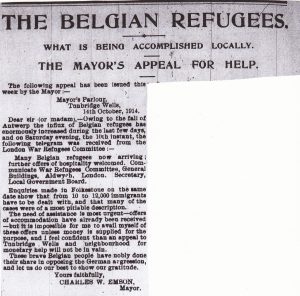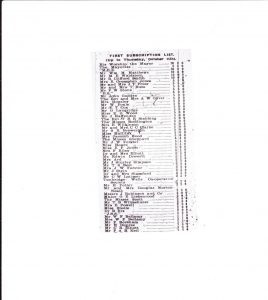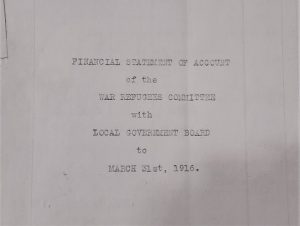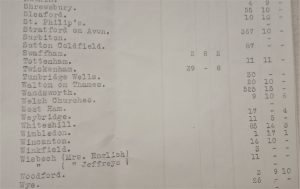With the outbreak of the war on 4 August 1914, and the speed of the initial German advance in Belgium, it became quickly clear that there would be a problem of fleeing refugees; on military grounds it was thought desirable to remove refugees away from the ports and coasts of Belgium.
The War Refugees Committee (WRC) was set up on 14 August as a voluntary body. With the help and encouragement of government agencies the embryo of the organisation was created in London, and from September, with an additional centre in Folkestone. The Local Government Board (LGB) had a central role in providing the framework and finance for dealing with the refugees from Belgium nationally, and in September the LGB stepped in to support the WRC. There was already in existence a recent blueprint for the reception and housing of refugees. The crisis over Home Rule in Ireland had reached the point in 1913 where preparations for civil war in Ulster foresaw the removal to safety in England of thousands of Protestant women and children: arrangements for their registration, transport and safe housing had been put in place by the Ulster Committee. This Committee placed at the disposal of the WRC all its preparations, down to a stock of forms for registration of the incoming refugees.
The initial national response to the refugee crisis was essentially voluntary. On 24 August the first country-wide public appeal by the WRC resulted in offers and donations from individuals and institutions that put at the disposal of the WRC within 14 days the wherewithal to provide hospitality for 100,000 refugees.
Under guidance from the WRC in London the approach adopted by local authorities around the country was the same, that is to fund the reception and housing of refugees through voluntary donations. In Tunbridge Wells Mayor Charles Emson set up a Belgian Refugees Committee in the Borough Council in mid-October, having been to London in September to consult the WRC and LGB for advice. Emson convened the first meeting of the Belgian Refugees Committee on 15 October, after issuing an appeal on 14 October for donations to a municipal fund (from the Tunbridge Wells Advertiser, 16 October 1914).

Money was needed to enable the Belgian Refugees Committee to take advantage of offers of accommodation which had already been received. Local newspapers also published the names of those who had made donations, or subscriptions.

The official report of the Tunbridge Wells Belgian Refugees Committee at the end of the war recorded that between October 1914 and March 1919 the Committee had provided accommodation – in hostels, rented furnished houses and premises provided rent free – for 131 refugees over the course of the period at an approximate cost of £80 per week (approximately equivalent to £5000 at today’s prices).
Until December 1915 the work of the Committee had been funded to the tune of £6,476 (£686,195 today), without, as the report put it, “asking the London Committee to give any financial assistance”. In other words this was all money collected from public subscriptions in Tunbridge Wells. The Borough Council also contributed to the welfare of the refugees in less tangible means, by for instance, not demanding rates (the equivalent to today’s Council Tax) where houses were occupied by Belgian refugees, or waiving claim to any proportion of school fees in respect of Belgian refugee children. In effect refugee children were given free schooling in the Borough.
Over time however private donations and hospitality began to gradually fall off, and in January 1915 the Local Government Board had sent a memo to local councils noting this falling off, and stating that the care of refugees was a national obligation, and that the War Refugees Committee would pay local authorities 10/- a week (£53 equivalent today) to accommodate refugees. It was not until December 1915 that Tunbridge Wells needed to call on central government funds.
The Borough Belgian Refugees Committee’s 1919 report goes on to record that from December 1915 to August 1917, the Central War Refugees Committee contributed half of the cost of maintenance of the refugees, and from August 1917 the whole cost of their maintenance. The Financial Statement of Account of the WRC with LGB for the year to 31 March 1916 shows that Tunbridge Wells received £30 for the first 3 months of 1916 (£2833 equivalent today).


The following year saw Tunbridge Wells receive £1,042. The report gives the total amount contributed by the WRC to Tunbridge Wells’s refugee expenses as £6,564 (£524,421 now).
By 1917 of course some refugees had returned home to Belgium and many had found employment to support themselves. The average expenditure of the local committee during the whole period of the war is given as £50 per week. In addition at the end of the war grants were also needed in a few cases to assist in the repatriation of Belgian families back home.
Sources
- Borough of Royal Tunbridge Wells Belgian Refugees Committee report, October 1915 (sic) to March 1919
- War Refugees Committee, article by W.E.Dowding, Imperial War Museum, BEL 14/4
- Memorandum on the Reception of Belgian Refugees January 1915, War Refugees Committee, Imperial War Museum BEL 1/2/7
- Tunbridge Wells Advertiser, 16 October 1914
- Financial Statement of Account of the War Refugees Committee with Local Government Board, to March 31st, 1916
- ThisisMoney price and inflation calculator. As there was serious inflation during the war years 1914-1918 the current equivalent of contemporary values differs for each year eg £80 in 1915 was worth the equivalent of £,476 now, £80 in 1916 = £7,554 now, £80 in 1917 = £6,391 and £80 in 1918 = £5,096 now.
